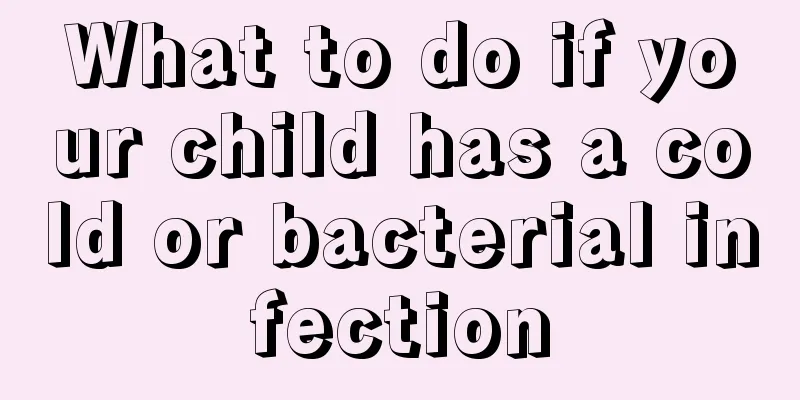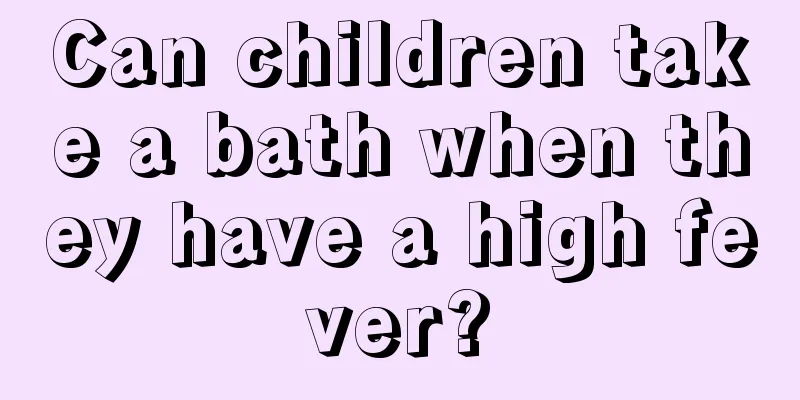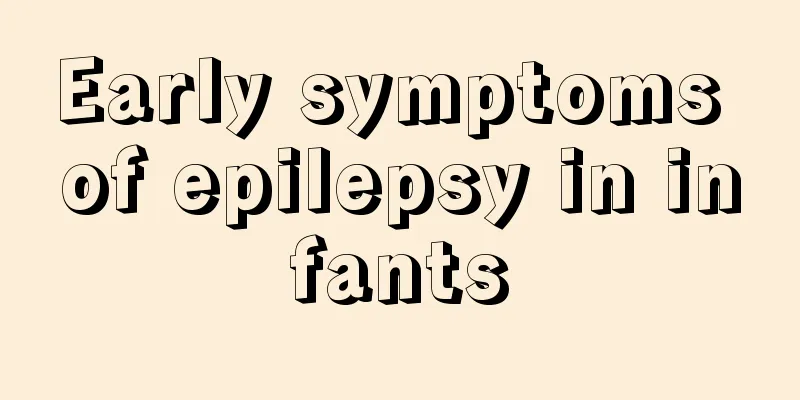What to do if your child has a cold or bacterial infection

|
There are two types of colds in children. One is a viral cold, which is the more common type of influenza, also known as the flu. Another type of cold is caused by bacterial infection, which is generally more difficult to treat and harder to cure. The same is true when children have a cold or bacterial infection. After all, children's immunity is not as good as adults, and symptoms such as high fever and convulsions often occur. So how should we treat this situation? Generally, it is recommended to use antipyretics when the baby's body temperature exceeds 38.5 degrees, because low fever can promote the body's defense system to fight against viruses. Antipyretics can be selected from children's Tylenol, Enric, etc., which are relatively safe antipyretics. Pay attention to the following points after the baby catches a cold: 1. Get enough rest: For colds, good rest is crucial. Try to let your child sleep more, reduce outdoor activities appropriately, and don't let your baby get tired. 2.2. Drink more boiled water: Due to reasons such as fever, rapid breathing, coughing and increased secretions in the trachea, the child loses a lot of body fluids. Therefore, you should pay attention to replenishing more fluids. The best fluid is boiled water. Whether it is in the early prevention or the later treatment process, it is important to drink more boiled water, which is convenient for preventing dehydration, reducing the viscosity and dryness of secretions in the respiratory tract, and helping the child to cough up sputum. 3. Eat more vegetables and fruits: When children have a cold, the consumption of vitamins in the body increases and the vitamin content in the blood decreases, so pay attention to eating more dark green and orange-green vegetables and fruits rich in vitamins in the diet to increase the children's resistance to disease. 4. Eat easily digestible food: Children with colds generally have poor appetite due to the impact on the activity of digestive enzymes in the stomach, and may even have symptoms such as vomiting, diarrhea and constipation. Therefore, the food given to the child should be easy to digest, not too salty or too sweet, and should not be greasy or irritating. 5. Avoid eating granular hard nuts: Children with colds are prone to coughing. Be careful when eating granular hard nut snacks to prevent accidental inhalation of food into the human organs and causing foreign matter in the trachea. 6. Eat small meals frequently during illness: For children with a cold, dietary care should not only satisfy the child's taste, but also pay attention to a reasonable combination of nutrition. In addition to breakfast, lunch and dinner, additional meals are provided in the morning. Foods such as milk, egg custard, fruit, juice, chopped vegetables and thick porridge are preferred. What causes your baby's cough? If the baby is allergic to eggs or fish, please stop eating them. If the baby has a respiratory infection and has no allergic symptoms, he can eat it. 7. Do not force a sick child to eat anything he does not want to eat unless the doctor has a specific reason to do so. Otherwise, it may easily lead to vomiting and cause intestinal discomfort. Through the above introduction, I believe everyone has certain strategies to deal with children’s colds and bacterial infections. I hope it will be of some help to parents with children. In normal times, we should also do a good job of prevention and develop a series of exercise plans to strengthen children's physical fitness and improve their immunity, so as to resist the invasion of germs. Next, pay attention to hygiene and cultivate good hygiene habits in children to prevent the growth of bacteria, which will play a certain role in preventing bacterial infections and colds. |
<<: TCM treatment of ADHD in children
>>: What should I do if my child snores and holds his breath while sleeping?
Recommend
8 types of food to avoid before 1 year old
1. Honey Danger point: Ingredients contain botuli...
Will acute gastroenteritis in babies cause myocarditis?
If there is a baby at home, parents have a great ...
What causes red spots in children's eyes?
Any problem of the child will concern the parents...
Is it necessary for children to attend early childhood education?
In order to enable their children to learn more k...
Causes of constipation after weaning
It is very common for babies to become constipate...
What's wrong with a two and a half year old child who can't speak?
Parents are very concerned about their children&#...
What to do if your child is allergic to shrimp
In our lives, due to some external reasons and ou...
Why do children keep tossing and turning when sleeping at night?
Sufficient sleep is the basis for us to ensure th...
What to do if your child has crossbite
Most people notice this dental abnormality during...
My child's eyes suddenly became swollen. What happened?
Children under three years old are in the first c...
Baby allergy diarrhea symptoms
Many people will encounter allergy problems in li...
Why does a newborn baby cry when feeding?
If a newborn baby cries while feeding, does it me...
What to do if your child drools while sleeping
Drooling seems to be a very normal thing for chil...
How to cut newborn baby's nails
When a newborn is just born, all parts of the bod...
The 8 best times to educate your children
American psychologist and family issues expert Ro...









